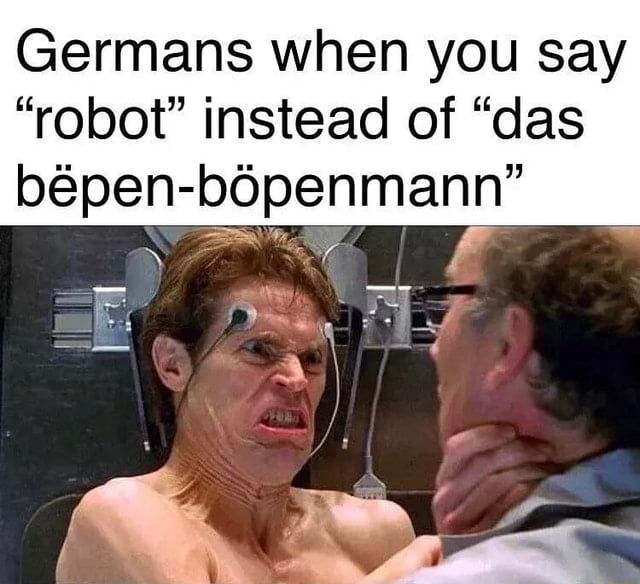It's "die bëpen-böpenmann", stupid!
196
Be sure to follow the rule before you head out.
Rule: You must post before you leave.
Show that kind of hostility while you can puny human.
Was zum fick ist ein biben böbermanm?!
Makes me chuckle thinking of the show “Mr. Bepen-bopenmann”
Once I dared to not call a Blahaj a "die Transgenderenhaifisch".
Excuse me it's Blåhaj
Swedes, when you type Blahaj instead of Blåhaj, because you're too lazy to switch from your physical to on-screen keyboard with diacritic support.
(Any way to type special letters on Android without installing different key layouts while on a bluetooth keyboard?)
excuse me but its “Das Transgenderhaifischplüschtier“
Incredible they have a word for that. They really think of everything.
It's just shrimple compound words and maybe agglutination. You can form words decently synthetically (although not very agglutinatively) in English to an extent too – in fact, English loves affixes quite a lot despite generally being more analytic than synthetic. For example, I now will demonstrate bipreindefenestratability. A word you might actually be able to find in dictionaries is "propreantepenultimate". Then there's words like "goodbye", formed from "God be with ye".
Another similar concept that doesn't go as far as agglutination is compound words, which English also likes (often times they may have a hyphen or space between them in writing though, rather than just being glued together).
Germanic languages (including Old English and Old Norse) used to all have extensive compound word formation, but it has slowly became less and less pronounced of a grammatical feature over time in most languages. Another comment mentions German "Handschuh" ("Hand" + "Schuh", handshoe), there's also Dutch "handschoen" and Luxembourgish "Händsch"; well Old English had "handscōh" ("hand" + "sċōh", handshoe). Plus Modern English words like "handkerchief" (hand + kerchief/coverchef).
The German language is like legos. You can just slap words together to make new ones.
Like glove. It's Handschuh in German, which id hand-shoe. The language is full of words like this.
Such a shame that the German for shoe isn't foot-glove.
To prevent recursion obviously. It's like you have never languaged in your life.
So ein Blödsinn.
Hahaha
yeah
Klingt wie der Bi-Ba-Butzemann und das ist kein Roboter.
das Stör(t) mich
ich_iel users be like
Isn't robot Polish?
I can see it. There are a few tropes that come to mind:
- Robot is unique and alone
- Robots outlive their creators/creating civilization
- Robots discarded after their usefulness expired
And looking into the etymology of orphan makes it even clearer. Robots are often depicted as being dereft of rights, feelings etc.
It’s more because it comes from slave (arbeiten is also related), and both slaves and orphans deal with status changes, but that’s a lot more similarities than I had :)
No, Germans just do that.
Germans when you say
